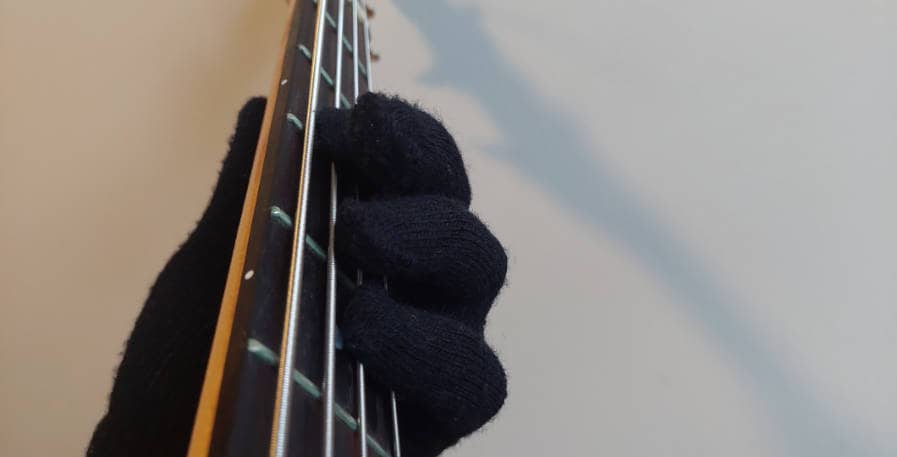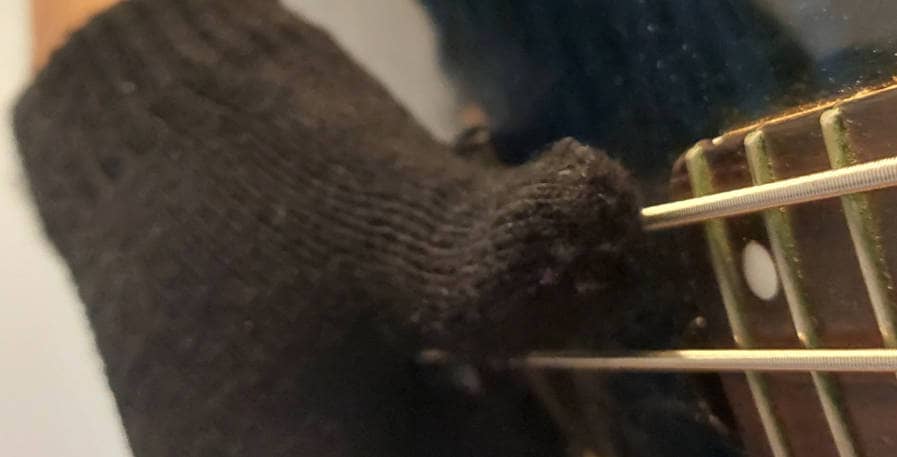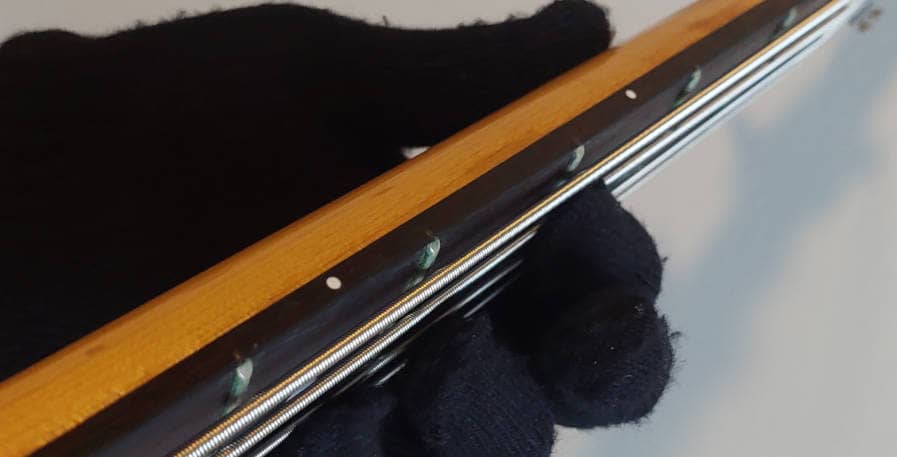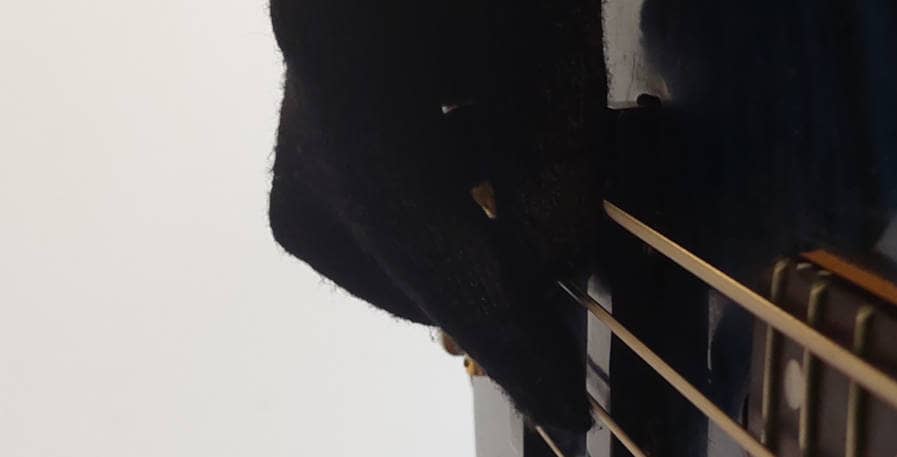While most bassists don`t wear gloves when playing the bass, I`ve found that it has become more and more common over the years.
For some, wearing gloves is helpful for preserving the health of their hands. Thus, it is unfortunate that some call this a trend, as many bass players that wear gloves often do so for a good reason.
For this reason, I decided to make this list of all the main reasons why bass players elect to wear gloves when playing their axe.
I`ve given it a try and found that it`s not for me. However, I can certainly see why playing with gloves is of great benefit to others. This is because for some gloves are an necessity to even be able to play the bass. For others, it`s a small optimization, or simply something they like to do.
Therefore, I`m keeping this list objective and to the facts, so that you can decide for yourself whether playing with gloves could be beneficial to you or not.
I`m a bassist, not a doctor, this is not medical advice.
1. Tone
Bass players tend to disagree on whether playing with gloves has any noticeable impact on their tone.
Legendary bassist Etienne Mbappé claims that playing with gloves results in a bigger and smoother tone. On the other hand, one of the most well-known online bass teachers Scott Devine, has stated that his playing sounds the same with or without a glove.
This can in part be attributed to technique and glove choice. However, I believe this ultimately comes down to how bassists differ in how meticulous they are about tone. Therefore, I`m going to let you decide for yourself by showing what playing with and without a glove sounds like.
Here is a recording of me playing without gloves.
And here is the same groove, but with me wearing gloves on both of my hands. I`t a thin pair; the same kind you can see in the photo at the start of this article.
While I`ll let you decide on whether there is any difference in tone, I want to point out one thing I noticed while running this experiment.
In general, I tend to pluck the strings really hard. However, when I tried playing with gloves it felt more natural to play with a softer touch.
Thus, gloves might lend themselves better for ballads and smooth jazz, but less so for punk and metal. This had less to do with how hard I could pluck the strings, but more so with how I was naturally inclined to pluck them.
2. Preventing strings from corroding
Not only can sweaty hands be uncomfortable to play with. The sweat can also result in corrosion and rusty bass strings.
When strings start rusting, they become increasingly harder to rejuvenate. They also sound unpleasant and become more prone to snapping. To top it all off, rust can make your bass strings produce a foul smell and can at worst lead to potentially fatal bacterial infections.
Thus, playing bass with gloves is helpful for preserving both the condition of your strings and your own health.
If your hands sweat a lot when you play the bass, gloves can thus be a great way to avoid health hazards. They can also be a great way to save money by not having to buy new strings due to them becoming rusty.
3. Preventing blisters and calluses
When playing the bass guitar, you are striking thick metal strings with your fingers. This leads to large amounts of friction, and thus it is common to develop blisters from playing bass.
Furthermore, after you have played the bass for a while, these blisters will start to develop into calluses. These are hardened spots of skin, that will not turn into blisters again, but rather remain though and sturdy. As improvement requires regular practice and the friction of the strings is hard to mitigate, calluses are common among bass players.
However, if you want to prevent blisters and calluses from forming, playing with gloves can help you achieve just that. Wearing gloves results in less friction and wear on the fingers. Thus, they can lessen the severity of blisters, or stop them from forming altogether.
In general, I recommend bass players to develop calluses, and rather focus on doing so in a healthy and painless way.
However, some prefer avoiding blisters and calluses altogether.
One reason for this is due to not wanting to deal with the pain. Others need to preserve the look of their hands either for personal reasons or because they have an occupation that requires it.
Thus, for those who want to play the bass guitar, but want to avoid blisters and calluses at all costs, playing with gloves is one way to avoid this problem altogether.

4. Nickel Allergy
The round wire that is wrapped around the core of a bass string is commonly made of nickel.
Thus, for bass players with a nickel allergy, this can lead to various forms of health issues. Common symptoms include rashes, as well as itchy and dry skin. Prolonged exposure to nickel can also cause the skin on the fingers to crack.
This happens because the sweat in the bassist’s hand blends with the nickel from the strings. As a result, bassists with nickel allergies tend to look for alternative ways to play the bass.
Oftentimes, they solve this by opting for strings with a round wire made of a different material, such as stainless steel.
However, some opt for playing with gloves instead. As the main cause of the allergy comes from sweat mixing with materials of the strings, gloves can diminish or mitigate the symptoms of the allergy.
Thus, for bassists with a nickel allergy that also prefer the tone or feel of nickel round wiring, gloves can be a less painful way of playing the bass while getting the type of tone they want.
5. Keeping hands warm
One of the best ways to make use of gloves as a bass player is to use them for their intended purpose.
Playing the bass with cold hands is cumbersome, and can greatly slow down your playing. Thus, cold hands can quickly ruin a band rehearsal, or worse yet, a live show.
While it`s a best practice to always warm up with finger exercises before playing bass live, this isn`t always enough.
Sometimes you simply won`t have the time, and other times you might cool down before your show actually starts. In some cases, you might even play at a venue with such a low temperature that no amount of warm-up is going to keep your hands warm during the show.
Furthermore, there are also medical conditions that can cause hands to feel cold. Some of these include Lupus, Anemia, and Raynaud’s disease. These conditions have a wide range of causes and can make it hard to keep your hands warm.
Thus, playing with gloves is a quick and simple solution to these problems. For most bassists, these will be issues that they run into on rare occasions. Because of this, it can be a best practice to keep a pair of gloves on hand and know how to play with them when they become a necessity.
6. Neurological disorder
Neurological disorders have an effect on both the mind and nerves of people who suffer from them. For bass players, they can be particularly detrimental when they affect the nerves in their hands, resulting in involuntary movements.
One such disorder is Focal dystopia. This condition leads to unintentional movements in certain body parts, such as the fingers or hands.
Some bassists like Cannibal Corpse`s Alex Webster have dealt with Focal Dystopia without the help of a glove. Other bassists, like the abovementioned Scott Devine also suffer from this disorder and play with a glove to mitigate the symptoms.
As Scott is unable to keep his fingers from shaking because of Focal Dystopia, playing the bass is extremely difficult. However, when wearing a glove, the shaking subsides completely and enables him to play again.
Thus, for sufferers of focal dystopia, playing with a glove can be a prerequisite for being able to play the bass guitar.

7. Longer practice sessions
Practicing the bass for long periods of time will eventually take a toll on your fingers. However, wearing gloves will reduce how quickly the strings wear down your fingers and effectively increase your stamina.
During practice, how you look and how you sound is less important than your improvement. This can make wearing gloves a fitting choice for bass players who practice a lot every day.
Thus, wearing gloves can ultimately help speed up your progress as a bass player. While the difference will not be major, wearing gloves can be worth it for bassists who want to hasten their improvement as much as possible.
8. Arthritis & Carpal Tunnel
Arthritis is a condition that makes certain joints swell. As a result, the joints can feel stiff and painful. When joints in the fingers, hand, and arm are affected, playing the bass can become painful and unpleasant.
Carpal Tunnel is another painful condition and results in hands feeling numb or tingling. For bass players who suffer from arthritis and carpal tunnel, the right kind of gloves can do a lot to alleviate the pain of playing the bass.
Bass players with arthritis tend to play with fingerless compression gloves. These gloves provide little to no protection against blisters or corrosion. Rather, they are tailored to make playing the bass feel less painful.
9. The aesthetics
Similar to pickup covers, some bassists simply prefer gloves because of how they look.
They might also choose to wear gloves because of other reasons on this list, with the main reason boiling down to aesthetics. Another possible reason is that it helps them stand out, and to create a conversation topic.
While a small detail, anything that makes you or your band more memorable is always a big plus.
Thus, from a purely stylistic point of view, there is always a benefit in doing what most people are not doing. As the majority of bassists are unlikely to play with a glove on anytime soon, wearing gloves certainly helps you stand out as a bass player.

10. To perform fretless techniques
Bassists who play a fretless bass might find it particularly helpful to play with a glove.
One reason for this is that fretless players tend to do a lot of sliding across the neck of the bass. With a glove on, these slides can feel a lot smoother to do. As a result, playing the bass can feel more effortless, natural, and less painful to the fingers.
Another common technique for fretless players is to add expression to notes with the help of vibrato and bends. These are techniques that can quickly wear down your fingers as they create more friction than when fretting notes regularly. Thus, gloves can help in preserving the condition of your fingers when performing these techniques.
For the same reason, double bass players or bassists transitioning from a fretless instrument to a fretted one can benefit from wearing a glove. This is because they will generally be accustomed to performing these techniques more often than most fretted bass players.
11. Sweaty hands and Hyperhidrosis
Hand sweat is a common problem for bass players. While it is a major problem to some, it is a complete non-issue to others. Personally, my fingers sweat a lot when I play, but I`ve also met lots of bassists and guitarists who barely sweat at all.
If you`re like me, you know how much hand sweat can affect your comfort as well as the playability of your instrument. While gloves aren`t for me, I can thus still understand why some bassists opt to play with gloves to solve this problem.
Some bassists have it even worse and suffer from hyperhidrosis.
This is a condition that makes a person sweat inordinately. It can affect either the whole body or a part of it, and the hands are a commonly affected area. Thus, playing with gloves can make playing the bass a lot more comfortable for people who suffer from hyperhidrosis.
12. To keep the neck smooth
When playing the bass, sweat and oils from your hands will transfer to the neck and fretboard of the instrument. As a result, both the fretboard and neck of the bass have to be regularly cleaned to preserve their condition. As oils and dirt build-up, this can also make the neck of the bass feel slower to play.
Playing with gloves prevents any oils or dirt from your hands to come in contact with the bass. Thus, it can be a great solution to reduce the amount of maintenance you need to do and preserve the playability of your instrument.
This can be especially noticeable on basses with a lacquer finish. While it`s a great finish for protecting the wood of the bass, it is also prone to getting sticky faster than other finishes, such as satin.
13. To withstand an alternate tuning
When tuning your bass as low as possible, it needs to be strung with heavy strings. This is done in order to have a balanced amount of tension and to get a resonant tone when tuning down.
Common alternate tuning options go as far down as Drop A. Tuning this low generally requires the E (or B for 5-string basses) string to be replaced with a string in the 145-160 gauge range. In more extreme cases, such as when tuning to Drop E, strings need to be as tick as 200-210.
As a result of this, the heavy strings can be demanding on your fingers, and cause an excessive amount of friction.
Thus, bass players who tune unconventionally low can counteract some of this friction by wearing gloves. This allows them to tune down and play heavy gauge strings, without wearing out their hands more than they need to.
Conclusion
Playing the bass with gloves isn`t for everyone. However, there are surprisingly many upsides to putting on a pair when playing your axe.
Gloves can be a great solution for bassists with a medical condition that hampers their playing. The most notable among these are Hyperhidrosis, Focal Dystopia, Arthritis, Carpal Tunnel, or a Nickel allergy.
Other advantages include less maintenance and strings lasting longer. This also has the added benefit of avoiding health risks from having your strings rust.
Gloves not only help preserve your bass but also your hands. They offer protection and keep your hands warm for gigs. They also allow you to practice for longer and can diminish or prevent the forming of blisters and calluses.
If this sounds like a good deal, the final question is whether you like the look and feel of playing with gloves. Some bassists like it, others don’t feel that it makes much of a difference. Personally, I found them awkward to play with.
Thus, whether you should play the bass with gloves on or not comes down to preference. With that said, I do recommend giving it a try, as there are surprisingly many benefits to playing with gloves on.

